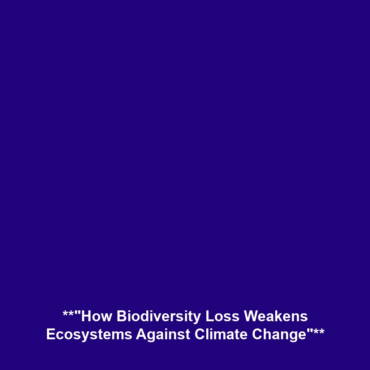How Biodiversity Loss Reduces Ecosystems’ Resilience to Climate Change
Introduction:
The rapid loss of biodiversity is one of the most pressing environmental issues facing our planet today. Within the broader context of deforestation and biodiversity loss, understanding how biodiversity loss diminishes ecosystems’ resilience to climate change is crucial. Healthy ecosystems provide essential services, such as carbon sequestration, water purification, and habitat stability, all of which can be severely affected by diminished biodiversity. This article will delve into the significance of biodiversity and the implications of its loss on ecosystem functionality in the face of climate change.
Key Concepts
To fully grasp how biodiversity loss reduces ecosystems’ resilience to climate change, it is important to discuss several major concepts:
Diversity in Ecosystems
A diverse ecosystem is more robust and better equipped to handle environmental stressors. The presence of multiple species enhances functional diversity, which is essential in maintaining ecological processes.
Interconnectivity of Species
Species within an ecosystem often have interdependent relationships. When biodiversity declines, these connections weaken, leading to reduced ecosystem services, which hampers adaptability to climate-related changes.
Impact of Climate Change
Climate change poses various threats, including rising temperatures, altered precipitation patterns, and increased frequency of natural disasters. Ecosystems with rich biodiversity often recover more quickly from these drastic shifts, whereas those lacking biodiversity exhibit lower resilience.
Applications and Real-World Uses
Understanding the implications of biodiversity loss is essential for developing effective strategies in the realm of conservation and climate change mitigation. Here are significant applications:
- Restoration Ecology: Restoration projects frequently focus on reintroducing biodiversity to enhance ecosystem resilience.
- Climate Policy: Policymakers advocate for biodiversity preservation to bolster ecological resilience against climate impacts.
- Community Planning: Urban and rural development plans now integrate biodiversity considerations to create sustainable habitats.
Current Challenges
Despite growing awareness, several challenges persist in studying or applying the concepts related to biodiversity loss:
- Data Gaps: There is inadequate data on global biodiversity trends and their ecological impacts.
- Ecological Complexity: The interactions between species and their environment are complex and not fully understood.
- Policy Implementation: Effective integration of biodiversity considerations into existing policies is often lacking.
Future Research and Innovations
Future research holds promise for understanding the interplay between biodiversity and climate change. Innovations include:
- Advanced Modelling Techniques: Using AI and machine learning to predict ecological responses to biodiversity loss.
- Genetic Research: Investigating how genetic diversity within species can affect resilience to climate impacts.
- Community-Based Conservation: Engaging local populations in biodiversity preservation as a way to enhance ecosystem function.
Conclusion
In summary, the loss of biodiversity significantly reduces ecosystems’ resilience to climate change, with profound implications for deforestation and biodiversity loss. As we explore strategies to combat climate change, preserving biodiversity must remain a priority. For further insights, consider exploring our articles on related topics such as ecosystem services and climate adaptation strategies.

Leave a Reply